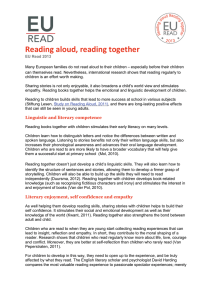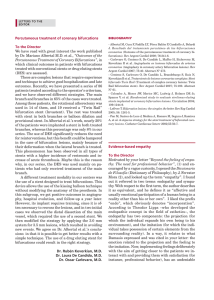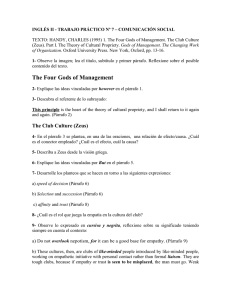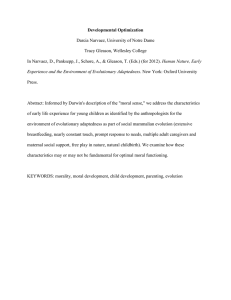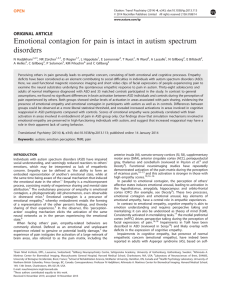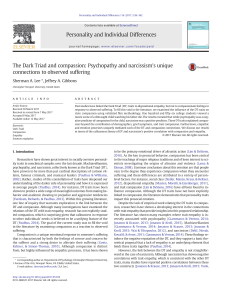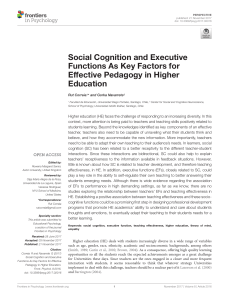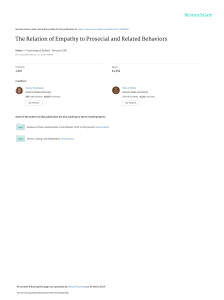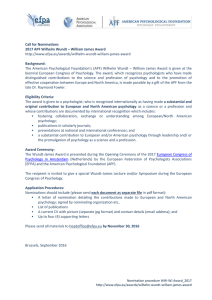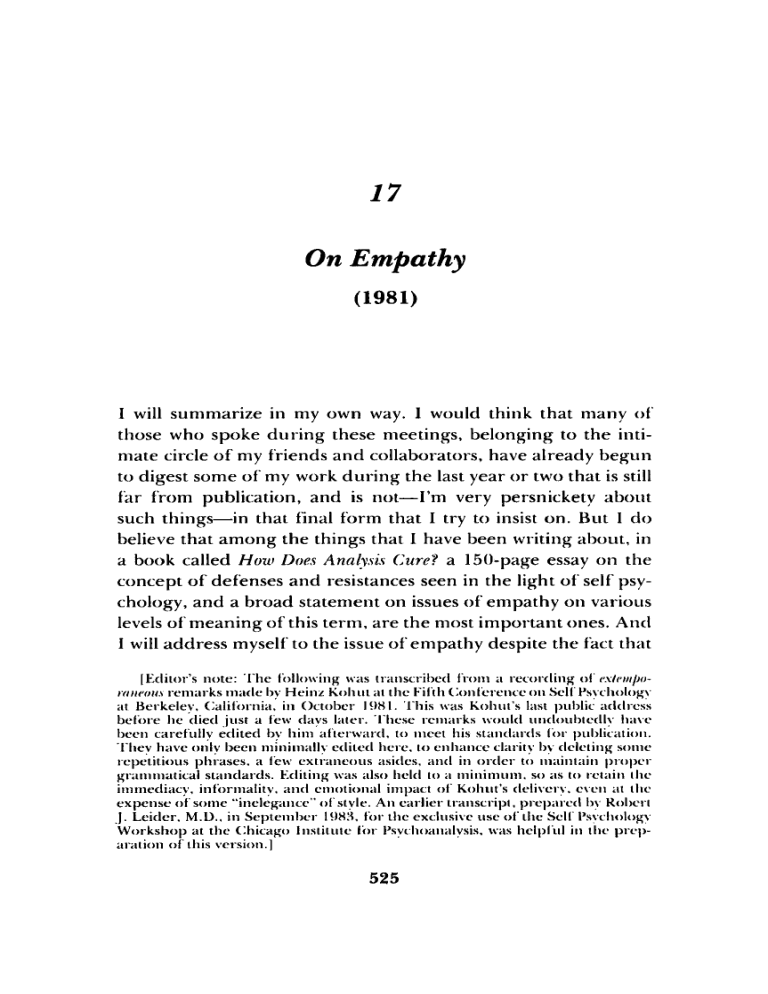
17 On Empathy (1981) I will summarize in my own way. 1 would think that many of those who spoke during these meetings, belonging to the intimate circle o f my friends and collaborators, have already begun to digest some o f my work during the last year or two that is still far from publication, and is not—I'm very persnickety about such things—in that final form that I try to insist on. But I d o believe that a m o n g the things that I have been writing about, in a book called How Does Analysis Cure? a 150-page essay on the concept o f defenses and resistances seen in the light of self psychology, and a broad statement on issues o f empathy on various levels o f meaning o f this term, are the most important ones. A n d I will address myself to the issue o f empathy despite the fact that [Editor's note: T h e following was transcribed from a recording o f exlt'in/iortinrous remarks m a d e by Heinz Kohut at the Fifth C o n f e r e n c e on Self Psychology at Berkeley. California, in October 1981. This was Kohut's last public address before he died just a lew days later, these remarks w o u l d undoubtedly have been carefully edited by him afterward, to meet his standards for publication. T h e v have only been minimally edited here, to enhance clarity by deleting some repetitious phrases, a few extraneous asides, and in o r d e r to maintain p r o p e r grammatical standards. Editing was also held to a minimum, so as to retain the immediacy, informality, a n d emotional impact o f Kohut's delivery, even at the expense o f some "inelegance'' ol style. A n earlier transcript, p r e p a r e d by Robert J. Leider, M . D . , in September 1983, for the exclusive use o f the Sell Psychology W o r k s h o p at the Chicago Institute for Psychoanalysis, was helpful in the p r e p aration o f this version.] 525 526 THE SEARCH FOR THE SELF some couple of years a g o I kept saying I'm sick of that topic. It seems to be nonproductive. I hear o v e r and o v e r again the same arguments, and they are so far o f f my meaning that I had the impression that I was wasting my time, my emotions, my energy that I could use on new ideas and new work. But idiot that I am, I still don't know, despite a fairly long life, and hopefully some attainment of wisdom, that when people keep asking you the same damn question, something must be wrong! Something is w r o n g . What is w r o n g is not what I said in 1959, in this pivotal paper of mine on "Introspection and Empathy," an investigation or an examination o f the relationship between m o d e of observation and theory. This [as the subtitle clearly indicates] was the paper; [it was] not on empathy, on being e m pathic as an act; [but] only on empathy as a definer of a field, [which is] therefore a field o f pure psychology, a field that relates to the inner life of man, the complex mental states—a definition of psychoanalysis that I have proposed many, many years a g o already. I think even in one of my presidential addresses, when I was still M r . Psychoanalysis and in the center o f the psychoanalytic m o v e m e n t , even then I said that [psychoanalysis was] the science of complex mental states, [a definition] which bypassed this specific theory, o r that specific theory, h o w e v e r important theories may be. It is just as important to realize [the necessity of omitting specific theories from defining our o w n field o f ] investigations, as it would be in [connection with d e f i n i n g ] , let us say, the physical sciences as the sciences that work with the theories o f causality, time, and space. By no means is that [explicit inclusion o f specific theories in the definition] necessary. There are physical sciences that d o not work with the theories of causality, time and space, and yet they are physical sciences. So the same is true for psychoanalysis. T h e r e is another reason why I want to g o back to empathy—namely, that I have a sense o f responsibility about the abuse of this concept. The fact again that people have acted as if I O N EMPATHY 527 were abusing it makes me g o up on a high horse, and say, " T h e s e idiots, they don't read what I write!" But again I should have listened. I f they misunderstand (undoubtedly there are also irrational motivations, probably narcissistic ones, competitiveness, G o d knows what, I don't know, and I don't really want to make these d u m b interpretations); the point is that if they misunderstand, other people must misunderstand, too. They will claim that empathy cures. They will claim that o n e has to be just "empathic" with one's patients and they'll be doing tine. I don't believe that at all! What d o I believe? B e f o r e I g o into the m o r e exact practical statements aimed to contribute a little bit o f antidote to the sentimentalizing perversions in psychotherapy about curing through love, through empathy, through kindness, through compassion, to just being there and being nice and " Y e s , I understand you"; before I g o into that, I think what I need to d o , if I take you seriously, and I think I should, is to define empathy on the various levels on which this concept can be used. A n d having done that, I believe I can c o m e back again and make clearer what I said in my most recent writings. Let me first talk about empathy very, very briefly in the way in which I used it in the epistemological sense in 1959. In 1959 I used it, as the beautiful w o r d goes ( I never quite understood it, I looked it up sixteen times already in the dictionary; I think by now I d o k n o w ) . In other words, in the most broadly based theorizing about a science, (and these are my words, I always like concrete and palpable words) in a most experience-distant way, a theorizing in the most experience-distant way about a science. A s such, that may not be easy for many p e o p l e to understand. A n d I thought about why. As such, it is a definer of the field and nothing else. External reality and the sciences that deal with external reality are defined by the operational stance of the observer—namely, extrospection, and I will add for theoretical reasons (although it plays a very small role in the physical 528 THE SEARCH FOR T H E SELF sciences) vicarious extrospection, corresponding to empathy. In other words, w e not only look at things theoretically, but we also listen to reports of people w h o have looked at things that we can't see either because we weren't there, w e couldn't be there, or because it is totally o r forever impossible to be there. Let us say, for e x a m p l e , scientists will instruct nonscientif ic astronauts what to look for on the m o o n , what to keep their eyes o p e n for, what particularly clearly to report about. W h e n the astronauts come back, they give their report (free association there is called debriefing), and the scientist evaluates now what he should d o with the data. T h i s is vicarious extrospection. [ R e g a r d i n g ] events, I mean physical events for example, in the ancient world, we have to rely on eye-witness accounts. W h e n was that eruption of Vesuvius? T w o different reports c o m e in with slightly different dates to be deducible from them. N o w we can think "where is the greater evidence?" It seems to me that's very, very similar to what the analyst does about the vicarious introspection o f his patient. W e cannot see what's g o i n g on in him. W e instruct him to report what's going on in his inner life. Introspection, pursued in a very particular way, for p r o l o n g e d periods, with due attention paid to all kinds o f obstacles to reporting o f things that are unpleasant to report. People in [history], let's say the G r e e k historians H e r odotus, X e n o p h o n , T h u c y d i d e s , they had axes to grind. Y o u know one was conservative, p r o Sparta; the other o n e was liberal, p r o Athens. W e have to know that, and then we'll take with a grain of salt what w e read and what we really believe. So outpatients of course have axes to grind. N o w mind you, I don't want to o v e r d o analogies. I know tremendous differences [exist] too. I ' m not suddenly forgetting my whole life as a listening psychoanalyst. I know how to listen to patients. So the analogies [should not b e ] overdrawn. But they have basic validity, I think. So really introspection and empathy are, in that sense, definers o f the field. T h a t means that they are defining our field as the inner life o f man and therefore that we are psychologists. O N EMPATHY 529 I d o not believe, however hard it was tried, that there is a possibility to create such a misalliance as psychobiology, or biopsychology, o r something on that order. It was tried and the results o f this attempt led to the worst distortions o f the perception o f man that psychoanalysis is guilty of: the introduction o f the drive (not the experience o f being driven, not a self lusting and wishing to kill—that's psychology); but "the drive," being processed by an apparatus, being tamed via influences of civilization on the e g o that filters the drive. Y o u know, I know my classical analysis so well; and t h a t . . . [ T h e r e was some laughter in the audience which interrupted Kohut, but then he responded to it] . . . no, I mean that, because I d o think that my colleagues don't. T h e y don't even know anymore what I am arguing about. But they have made compromises in a vague way. 1 never d o that a n y m o r e , I never think that way anymore. I believe all that. But nobody has ever faced u p to the issue as the issue deserves. Freud was a genius. T h i s is no way o f treating Freud—to by-pass him. Freud has to be respected for what he gave us, and what we can see about the shortcomings of what he did, from our vantage point. A n d I think that is the respectful attitude toward a genius o f some time ago. Secondly, I would say that introspection and empathy should be looked at as informers of appropriate action. In other words, if you understand, "put yourself into the shoes of," think yourself appropriately into the inner life of another person, then you can use this k n o w l e d g e for your purposes. N o w I don't know how many times I have stressed that these purposes can be of kindness, and these purposes can be o f utter hostility. If you want to hurt somebody, and you want to know where his vulnerable spot is, you have to know him before you can put in the right dig. That's very important. W h e n the Nazis attached sirens to their dive bombers, they knew with fiendish empathy how p e o p l e on the g r o u n d would react to that with destructive anxiety. T h i s was correct empathy, but not for friendly purposes. Certainly 530 T H E SEARCH FOR T H E SELF we assume on the whole that when a mother deals with her child, and when an analyst deals with his patient, correct empathy will inform her appropriate maternal and his appropriate therapeutic analytic action. So [empathy] is an informer o f appropriate action, whatever the intentions may he. That's clear, and I don't think it needs any further elaboration, I'm sure. So, we g o to the next o f the levels in which we can examine empathy. Empathy serves also, and this is now the most difficult part—namely, that despite all that I have said, empathy, per se, is a therapeutic action in the broadest sense, a beneficial action in the broadest sense o f the word. That seems to contradict everything 1 have said so far, and I wish I could just simply bypass it. But, since it is true, and I know it is true, and I've evidence for its being true, I must mention it. N a m e l y , that the presence of empathy in the surrounding milieu, whether used for compassionate, well-intentioned therapeutic, and now listen, even for utterly destructive purposes, is still an admixture of something positive. In other words, there is a step beyond an empathyinformed hatred that wants to destroy you; and an empathyless environment that just brushes you o f f the face o f the earth. T h e dreadful experiences o f p r o l o n g e d stays in concentration camps during the Nazi era in Germany were just that. It was not cruelly on the whole. ( T h e Nazis w e r e not sadistic or cruel in those camps. There were exceptions of course, it couldn't be otherwise, there are always some exceptions; but that was clearly punished, that was clearly frowned o n . ) T h e y totally disregarded the hu1 manness of the victims. T h e y were not human, either fully not human, or almost not human (there was a little shift between, I think, the Jews and the Poles, or something like that, in that respect). T h a t was the worst. '[Keillor's nolo: Neither the search ol the literature n o r eve-wituess accounts substantiate either the absence o f sadism or their punishment when these did occur. In tact, all eye-witnesses report frcc|iicnt a n d most brutal sadistic acts without evidence of attempts to c u r b these o r to punish the o l l c n d e r . N e v e r theless. Kohut's basic thesis that the Nazis aimed at lotal dehuinani/.ation of c a m p inmates, b e f o r e and d u r i n g their extermination, is I hereby not allered. | 531 ON EMPATHY There is a touching story—again I c o m e back to the astronauts, you may r e m e m b e r it—of the astronauts when their spaceship, before landing on the m o o n , was hit by a meteorite, that's the theory. A n d they seemed to have lost control over it. A n d they had the choice, if there was indeed a loss of control, to g o on circling for many, many weeks with their supplies, or to g o back to Earth and—because they couldn't slow down—get scorched and burned up upon entering. A s they w e r e discussing this issue a m o n g themselves—there was no question in their minds: " W e would never want to have our remains circle forever in empty space. Even if we burn up, it's Earth, it's our h o m e . " A n d that, I submit, stands for an empathic human milieu. There are many other examples that I could give you. I will not. 1 will at this moment g o a little bit on a side [trip] and talk about an aspect of my book that 1 consider to be quite an important one, namely, my differentiation between castration anxiety and disintegration anxiety; between the [fear o f ] loss of a prized part o f the body and the [fear o f ] wiping out of the [whole] self. I won't talk about castration anxiety, everybody knows what that is. But disintegration anxiety is not so easy. Disintegration anxiety means the loss of empathy, the loss of an empathic milieu, the loss o f an understanding milieu, not necessarily o f the correct action, but the loss o f any understanding. There are children with horrible mothers and fathers, misunderstanding their kids, reacting to them in horrible ways ( o h . of course, they show the scars when they g r o w u p ) ; but the worst suffering I ' v e seen in adult patients is in those very subtle, and difficult to uncover, absences of the mother—because her personality is absent. N o t h i n g will be told about it, because the patient assumes this is the milieu in which people grow up. H e had been made to feel guilty all his life for yearning for something else, for making demands. A n d the mother rightly made him [feel] guilty because he d e m a n d e d something that just wasn't in her to give. It is the hidden psychosis of the mother, a much 532 T H E SEARCH FOR T H E SELF m o r e frequent early circumstance, than has been understood. It is a psychosis o f the mother that Kafka described so well in The Castle—the attempt to come close and yet there is absolutely no response; o r in The Trial—the wish to know what he's guilty about. T h e r e is no guilt, he's just disregarded, the knife turns and he's—that's the end o f him. Metamorphosis—the changing to an ugly insect because the parents in the next r o o m speak o f him in the third person singular—he's doing that, he's d o i n g that, clearly excluding him. Sometimes the reports are very subtle and you have to be very, very perceptive to grasp them. In one o f my patients, it was the mother's hiding behind bridge cards. W h e n e v e r he came, there were those bridge cards between him and her. But she had nothing to give. It is this emptiness that leads to the worst sufferings later in life. W e l l now, how does all this fit with what probably is the most important point that I made in Hmv Does Analysis (hire? I submit that the most important point that I made was that analysis cures by giving explanations—interventions on the level o f interpretation; not by "understanding," not by repeating and confirming what the patient feels and says, that's only the first step; but then [the analyst has] to m o v e on and give an interpretation. In analysis an interpretation means an explanation o f what is going [ o n ] in genetic, dynamic, and psychoeconomic terms. I , for some reason, don't want to open the can o f worms o f Hartmann's adaptive point o f view now—which I believe is a foreign body in analysis, however, brilliant this bridging concept to sociology may be. But I believe that the m o v e from understanding to explaining, from confirming that the analyst knows what the patient feels and thinks and imagines (that he's in tune with his inner life), and the next step o f giving o f interpretations is a m o v e from a lower form o f empathy to a higher form o f e m pathy. Interpretations are not intellectual constructions. I f they are, they won't work; [they might w o r k ] accidentally, but not in principle. A g o o d analyst reconstructs the childhood past in the ON EMPATHY 533 dynamics o f the current transference with warmth, with understanding for the intensity o f the feelings, and with the fine understanding o f the various secondary conflicts that intervene as far as the expression o f these [childhood wishes and needs] are concerned. T h e paradigm, or should I rather say (because that's now a loaded w o r d too, for some crazy reason), the prototype, the prototype o f this shift—this two-step m o v e from understanding to explaining—is, in childhood, a particular situation that I described, hopefully with feeling, in my new work, How Does Analysis Cure? I [cited there the example o f ] a child and his mother in the park. T h e child, as a young child always [does], clung to the mother. But the sun was shining, pigeons were walking around there. A l l o f a sudden, the child felt a new buoyancy and daring and he moved away from the mother, toward the pigeons. H e went three to four steps, and then he looked back. T h e general interpretation of that is that the child is anxious; he wants to be sure he can come back to be encased by the mother's arms again, cradled, etc. I think all that is true. But something much m o r e important is true. H e wants to see the mother's proud smile of his achievement. H e wants to see her pride, "look at him moving out now, on his own, isn't it wonderful?" A n d at this moment something extremely important has happened. A low form of empathy, a body-close form o f empathy, expressed in holding and touching and smelling, is n o w expressed only in facial expressions and perhaps later in words, " I ' m proud of you, my boy." N o w that's an interpretation, or at least it is the parallel to the interpretation in psychoanalysis. H o w ? I told you already—there is understanding that is sort o f like the bodily holding, a merger, and then that is given up later on (in some sick p e o p l e it might take a long time before o n e can actually make the next step); and then as the next step is made, it is o n a much higher form o f empathy, empathy in a complex way, with [explanation o f ] the past and how the present repeats it, all the forces that are involved—and given careful expression, 534 T H E SEARCH FOR THE SELF it's still empathy. It's still psychological (and in that sense on a higher level), [it is now an] understanding [ o f ] the message. I think that's extremely important, and shows you that what you really need to investigate carefully is what I've c o m e to call the developmental line o f empathy—from its early archaic beginnings, to such high levels as barely touching, as barely still having any trace o f the original holding that communicates the empathic understanding. So that essentially tells you what I think about empathy. It is something that I could talk about for a long, long time. But as I said, and with that I want to close, I bring this up for many, many reasons. But one o f the main reasons is the responsibility that I feel that you must not abuse the concept o f empathy for vaguely supportive measures, but grasp the idea o f what empathy is, in fact, on various levels o f its development. Certainly I'm not stodgy, and I think the m o r e one knows, the greater one's f r e e d o m . The m o r e one knows, the less important some ritual that one sticks to anxiously, because no one knows what is appropriate and what is inappropriate. There is always the question o f how to treat people with very serious self disturbances, w h o cannot possibly benefit from interpretations. I believe. It's too soon, and for many years, they d o need an empathic understanding on the closest level that we can muster. A n d it does not mean that o n e cannot m o v e naturally, slowly, and gradually into higher forms o f empathy and explaining, much, much, much later on. I remember, and I think I'll close my remarks this morning with this, I believe, telling story. A b o u t fifteen years ago I was e n g a g e d in a long, long analysis with a woman w h o was extremely vulnerable. She lay d o w n on the couch the first time she came, having interrupted a previous analysis abruptly. She said she felt like lying in a coffin, and that now the top o f the coffin would be closed with a sharp click. I ' m telling it to you that way, because it expressed so well what she felt. She was deeply depressed, and ON EMPATHY 535 at times I thought I would lose her—that she would finally find a way out of the suffering and kill herself. But I didn't. A t one time at the very worst moment of her analysis, during the first year o r perhaps year and a half, she was so badly o f f I suddenly had the feeling [and said]: " H o w would you feel if I let you hold my fingers, for a little while now while you are talking? M a y b e that would help you." Doubtful maneuver. I am not recomm e n d i n g it, but I was desperate. I was deeply worried. So I gave her two fingers, m o v e d up a little bit in my chair, gave her two fingers. A n d now I'll tell you what is so nice about that story. Because an analyst always remains an analyst. I gave her my two fingers. She took a hold o f them, and I immediately m a d e a genetic interpretation to myself. It was the toothless gums of a very young child clamping d o w n on an empty nipple. T h a t was the way it felt. I didn't say anything. I don't know whether it was right. But I reacted to it even there, to myself, as an analyst. [ A f t e r this o n e occasion] that was never necessary anymore. I wouldn't say that it turned the tide, but it overcame a very, very difficult impasse at a given dangerous moment, and gaining time that way we went on for many, many m o r e years with a reasonably substantial success. So with that I think I will now close. I'm very glad you waited for m e . I'm quite sure this will be the last self psychology meeting that I will attend, but I wanted to d o my utmost to be able to g o through with my promise. So, let's all hope for a g o o d future for the ideas e m b o d i e d in self psychology. Good-bye.
